Potrebujeme váš súhlas na využitie jednotlivých dát, aby sa vám okrem iného mohli ukazovať informácie týkajúce sa vašich záujmov. Súhlas udelíte kliknutím na tlačidlo „OK“.
ASTM F2996-13
Standard Practice for Finite Element Analysis (FEA) of Non-Modular Metallic Orthopaedic Hip Femoral Stems
Automaticky preložený názov:
Štandardné praktiky pre analýzy konečných prvkov (MKP) Non-Modular kovové ortopedické Hip driekov
NORMA vydaná dňa 15.7.2013
Informácie o norme:
Označenie normy: ASTM F2996-13
Poznámka: NEPLATNÁ
Dátum vydania normy: 15.7.2013
Kód tovaru: NS-54827
Počet strán: 11
Približná hmotnosť: 33 g (0.07 libier)
Krajina: Americká technická norma
Kategória: Technické normy ASTM
Kategórie - podobné normy:
Anotácia textu normy ASTM F2996-13 :
Keywords:
computational simulations, displacements, FEA, finite element analyses, model calibrations, model validations, model verifications, orthopaedic implants, solution sensitivity, strains, stresses, ICS Number Code 11.040.40 (Implants for surgery, prothetics and orthotics)
Doplňujúce informácie
| Significance and Use | ||
|
3.1 This practice is applicable to the calculation of stresses seen on a femoral hip stem when loaded in a manner described in ISO 7206-4 (2010). This method can be used to establish the worst case size for a particular implant. When stresses calculated using this practice were compared to the stresses measured from physical strain gauging techniques performed at two laboratories using two different methods, the results correlated to within 8 %. |
||
| 1. Scope | ||
|
1.1 This practice establishes requirements and considerations for the numerical simulation of non-modular (that is, limited to monolithic stems with only a femoral head / trunnion taper interface) metallic orthopaedic hip stems using Finite Element Analysis (FEA) techniques for the estimation of stresses and strains. This standard is only applicable to stresses below the yield strength, as provided in the material certification. 1.2 Purpose—This practice establishes requirements and considerations for the development of finite element models to be used in the evaluation of non-modular metallic orthopaedic hip stem designs for the purpose of prediction of the static implant stresses and strains. This procedure can be used for worst case assessment within a family of implant sizes to provide efficiencies in the amount of physical testing to be conducted. Recommended procedures for performing model checks and verification are provided to help determine if the analysis follows recommended guidelines. Finally, the recommended content of an engineering report covering the mechanical simulation is presented. 1.3 Limits—This practice is limited in discussion to the static structural analysis of non-modular metallic orthopaedic hip stems (which excludes the prediction of fatigue strength). 1.4 The values stated in SI units are to be regarded as standard. No other units of measurement are included in this standard. 1.5 This standard does not purport to address all of the safety concerns, if any, associated with its use. It is the responsibility of the user of this standard to establish appropriate safety and health practices and determine the applicability of regulatory limitations prior to use. |
||
| 2. Referenced Documents | ||
|
Podobné normy:
Historická
1.9.2009
Historická
1.11.2012
Historická
15.1.2012
Historická
1.11.2013
Historická
1.3.2013
Historická
1.10.2008


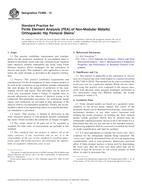
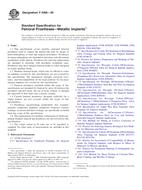 ASTM F2068-09
ASTM F2068-09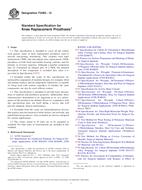 ASTM F2083-12
ASTM F2083-12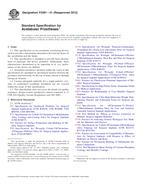 ASTM F2091-01(2012)..
ASTM F2091-01(2012)..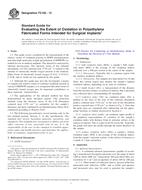 ASTM F2102-13
ASTM F2102-13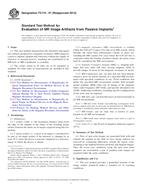 ASTM F2119-07(2013)..
ASTM F2119-07(2013)..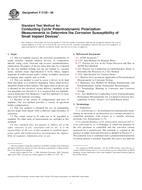 ASTM F2129-08
ASTM F2129-08
 Cookies
Cookies
